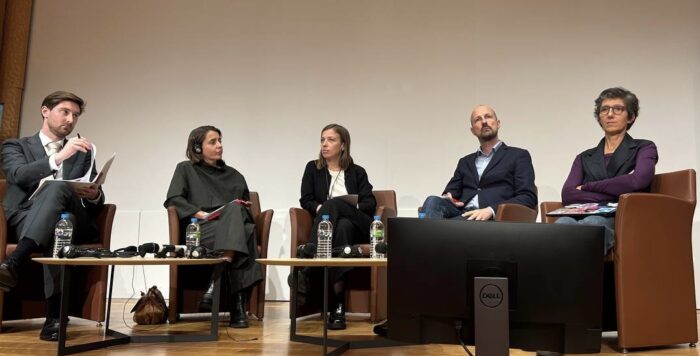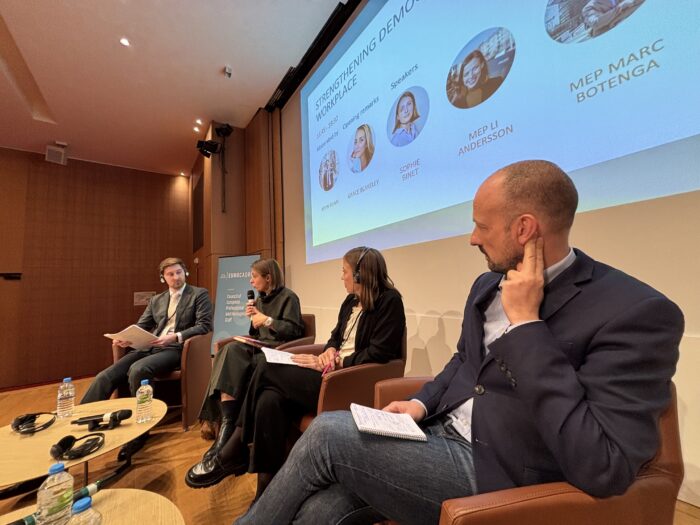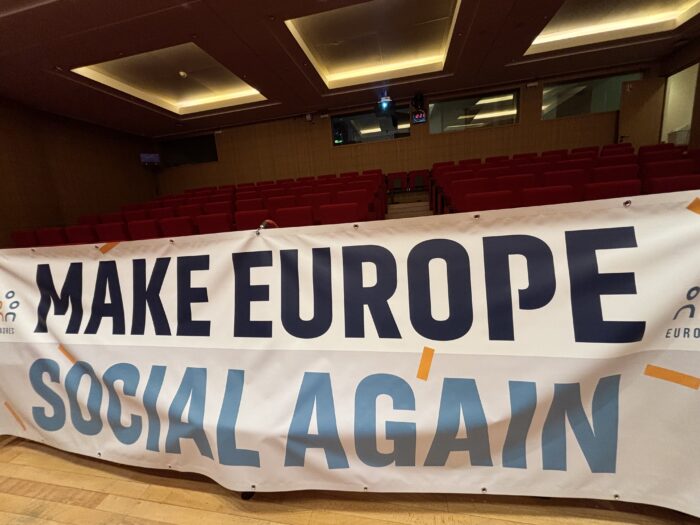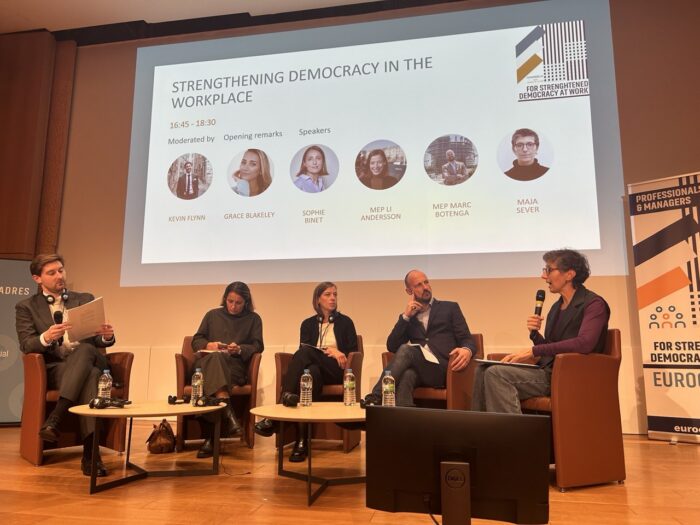
At the Eurocadres Congress, a trade union representing professionals and managers across Europe and one of the three recognised European cross-sectoral social partners, Eurocadres plays a key role in European social dialogue. On the panel “Strengthening Democracy in the Workplace” Maja Sever spoke on behalf of the European Federation of Journalists about the vital role of journalism in defending democracy. Eurocadres’ mission – “to be the trade union driver of change for a fair and sustainable knowledge-based Europe” captured the spirit of the conference and the discussion. The panel was opened by Grace Blakeley, a British economist, journalist, and author, who has long been analysing corporate power and the late stage of capitalism. Blakeley emphasised that many European parties today are so deeply rooted in neoliberal economic values that they struggle to revive genuinely democratic politics. In her opening speech, she analysed the narrative of the far right and the left’s inability to reach and mobilise workers. Blakeley argued that returning power to workers must be the way forward and called for alternative economic models built on the strength of communities, not on the hegemony of global capital. Her message was clear: only through collective action can citizens break the alliance between the ultra-rich and the far right, and defend the possibility of a genuinely free life for everyone.
Sophie Binet, General Secretary of the French union CGT, spoke about recent developments in France and the importance of trade unions assuming their social and political role in confronting the far right, which, as she stressed, directly attacks union organisation and workers’ rights. She described how in France, the rise of the far right was prevented through the broad mobilisation of trade unions and citizens. Binet emphasised that the far right is not a normal political option, but rather a threat to social cohesion, workers’ solidarity, and democracy. French trade unions, she said, have just launched a significant campaign against racism and antisemitism in the workplace, because these struggles must be fought together and without ambiguity. Voting for the far right is no longer a protest vote but a misguided vote of hope. The task of unions is to offer real solutions and concrete alternatives that protect workers’ rights. Li Andersson, Member of the European Parliament, Chair of the Employment & Social Affairs Committee and leader of Finland’s Left Alliance, followed with an example from Finland – a country already living with the consequences of a right-wing and far-right coalition government. “Finland is one of the few countries in Europe where we have already seen and experienced what happens when the far right and traditional right work together.” She explained that this government’s policies have meant attacks on trade unions, restrictions on the right to strike, cuts in social protection and healthcare, and reduced funding for climate and environmental programmes. “We have seen what cooperation between the right and far right really means – historic cuts and an erosion of workers’ rights.” Andersson also emphasised the importance of forming broad, progressive coalitions to challenge such destructive models. Marc Botenga, Belgian MEP (PTB/PVDA), spoke about the importance of authentic left-wing politics and the role of trade unions in creating a social counterweight, emphasising that real power lies on the streets, as recent mass protests in Belgium have shown. He spoke about how to force governments to truly listen to workers in the context of Belgium’s “Arizona coalition”, which has faced widespread public discontent. This has been a year when workers have shown they can change the narrative. When trade unions unite and people take to the streets, governments can no longer ignore their demands. Botenga also warned of a broader trend – the rolling back of civil liberties and workers’ rights, both in Europe and the United States. If Europe allows itself to fall into ‘Trump’s world,’ we will lose what makes us different – social justice and collective rights. That is why the fight for workers’ rights is essential.
Marc Botenga, Belgian MEP (PTB/PVDA), spoke about the importance of authentic left-wing politics and the role of trade unions in creating a social counterweight, emphasising that real power lies on the streets, as recent mass protests in Belgium have shown. He spoke about how to force governments to truly listen to workers in the context of Belgium’s “Arizona coalition”, which has faced widespread public discontent. This has been a year when workers have shown they can change the narrative. When trade unions unite and people take to the streets, governments can no longer ignore their demands. Botenga also warned of a broader trend – the rolling back of civil liberties and workers’ rights, both in Europe and the United States. If Europe allows itself to fall into ‘Trump’s world,’ we will lose what makes us different – social justice and collective rights. That is why the fight for workers’ rights is essential. Maja Sever emphasised that the state of media freedom in Europe directly reflects the state of democracy, both in institutions and in the workplace. According to data from the Mapping Media Freedom database, in the first half of this year, there were 709 recorded violations of media freedom, affecting more than 1,200 journalists and newsrooms – a figure that represents only a fraction of the actual situation, which is likely much worse. She explained that the EFJ’s response is, above all, a human one – they try to speak with every one of those 709 people, because behind each number is a person facing pressure, violence, or job loss. As an organisation, the European Federation of Journalists works with its members to raise concerns about these figures, such as when they recently wrote to European Commission President Ursula von der Leyen ahead of her visit to Serbia to highlight the situation there. TheEFJ also works to strengthen its members’ trade union capacities, improve collective bargaining, protect journalists, and ensure the implementation of the European Media Freedom Act (EMFA) – so that every newsroom can become a space of democracy and free expression. Sever stressed that journalists often work in precarious conditions, which weakens both their professional and labour status. In some countries on the path to EU accession, there are no journalists’ unions at all and no collective agreements in media companies. Journalists are underpaid, under-protected, and overworked – and this directly undermines their independence. She emphasised that all actors in society must demonstrate understanding and respect for the work that journalists do. “We are not here to be comfortable or nice – we are journalists, and our job is to ask difficult questions,” she said during the panel and to the MEPs present. Sever also warned that the narrative spread by the far right often targets journalists as enemies, blaming them for society’s problems. She called for respect for the profession and for ensuring that laws and directives such as EMFA, the Anti-SLAPP Directive, and other EU media laws are fully implemented at the national level – to provide a genuine framework for protecting journalists’ work and their labour rights. And finally, she posed a key question: do we really want our children and parents, our citizens, to be informed by algorithms of big tech platforms and social networks – or do we want to support quality, professional, independent journalism? That is a fundamental question of democracy, and everyone can contribute to the answer.
Maja Sever emphasised that the state of media freedom in Europe directly reflects the state of democracy, both in institutions and in the workplace. According to data from the Mapping Media Freedom database, in the first half of this year, there were 709 recorded violations of media freedom, affecting more than 1,200 journalists and newsrooms – a figure that represents only a fraction of the actual situation, which is likely much worse. She explained that the EFJ’s response is, above all, a human one – they try to speak with every one of those 709 people, because behind each number is a person facing pressure, violence, or job loss. As an organisation, the European Federation of Journalists works with its members to raise concerns about these figures, such as when they recently wrote to European Commission President Ursula von der Leyen ahead of her visit to Serbia to highlight the situation there. TheEFJ also works to strengthen its members’ trade union capacities, improve collective bargaining, protect journalists, and ensure the implementation of the European Media Freedom Act (EMFA) – so that every newsroom can become a space of democracy and free expression. Sever stressed that journalists often work in precarious conditions, which weakens both their professional and labour status. In some countries on the path to EU accession, there are no journalists’ unions at all and no collective agreements in media companies. Journalists are underpaid, under-protected, and overworked – and this directly undermines their independence. She emphasised that all actors in society must demonstrate understanding and respect for the work that journalists do. “We are not here to be comfortable or nice – we are journalists, and our job is to ask difficult questions,” she said during the panel and to the MEPs present. Sever also warned that the narrative spread by the far right often targets journalists as enemies, blaming them for society’s problems. She called for respect for the profession and for ensuring that laws and directives such as EMFA, the Anti-SLAPP Directive, and other EU media laws are fully implemented at the national level – to provide a genuine framework for protecting journalists’ work and their labour rights. And finally, she posed a key question: do we really want our children and parents, our citizens, to be informed by algorithms of big tech platforms and social networks – or do we want to support quality, professional, independent journalism? That is a fundamental question of democracy, and everyone can contribute to the answer. The panel brought together different but deeply connected perspectives – from the economic critique of neoliberalism, through the mobilisation of trade unions against the far right, to the defence of media freedom as the foundation of democracy. All participants agreed on one essential point: the fight for workers’ rights, media freedom, and social equality is the same struggle.
The panel brought together different but deeply connected perspectives – from the economic critique of neoliberalism, through the mobilisation of trade unions against the far right, to the defence of media freedom as the foundation of democracy. All participants agreed on one essential point: the fight for workers’ rights, media freedom, and social equality is the same struggle.


